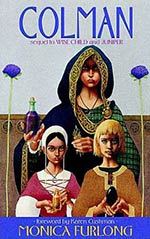
![]() thecynicalromantic
thecynicalromantic
7/27/2014
![]()
After nine years, I have finally gotten around to reading Monica Furlong's Colman, the third and final book in her Wise Child series. Wise Child was one of my favorite books when I was a young wannabe-witch (as opposed to now, when I am an old wannabe-witch), but I always thought of it as a stand-alone (mostly because it was during the period when I was rereading it frequently) so Colman was never really on my radar as a real thing. But after I reread Juniper earlier this year, I figured it was about time.
Colman follows directly on the events of Wise Child, which I admit I had sorta forgotten, and I might need to dig that out and reread it. But it looks like Juniper, Wise Child, Wise Child's father Finbar, her cousin Colman, and their former-leper friend Cormac are all on Finbar's boat running away from the town and Cormac's religious zealot brother. At first they flee to Ireland, where Cormac has family, but then they head to Juniper's old home of Cornwall, where she was a princess, and where she has a feeling that all is not well.
Upon arriving in Cornwall they find Juniper's parents dead, her brother Brangwyn imprisoned and kept as a sort of puppet regent, and her aunt Meroot and uncle-in-law the Gray Knight having taken over Cornwall and a big chunk of the Northlands. Meroot and the Gray Knight are not good rulers, oppressing the people with enormous tribute demands and enacting severe violence upon them when any demand is not met. The people are also forbidden from meeting in groups larger than six, which is always a bad sign. The lot of them, with the help of Juniper's ornery mentor Euny, conspire to save Prince Brangwyn and take down Meroot and the Gray Knight. The actual doing of this involves arms smuggling (largely on Finbar's part), disguises, a lot of doran magic, some help from the goddess that lives on top of the tor near Euny's hut, the obligatory getting work as a scullery maid in order to infiltrate the castle, and some surprising streaks of doran power from Colman, our narrator. Apparently there are sometimes male dorans, they just aren't very common. I wonder what Granny Weatherwax would have to say about that.
While the general story development of this book is perfectly fine—it's an exciting and satisfying way to wind up the trilogy, bringing in elements of both previous books into one storyline—one does get the feeling that if Monica Furlong hadn't died, it could have gone through another round or two of editing/rewriting, and could have been better. The dialogue is sort of awkward and chunky in parts, and I think some parts could have used further development. This book was published posthumously, so I don't really want to complain that anyone has done anything wrong in the development of the book—Ms. Furlong simply cannot be expected to rewrite sections posthumously, and I'm very, very glad that her estate did allow this story to be published, so that we her fans could read it and find out how the story ends. The whole thing's just very sad—perhaps not tragic, as Ms. Furlong did live a long and interesting life and she died at a respectably old age (I think she was 72?), but definitely sad. The choice to make Colman the POV character is a bit odd, but I think it works, as Colman is still essentially a child so we get to see his understanding of what is actually going on grow as the story goes on. He's also sort of a dorky and likeable and fairly everyman sort of character, which I think works well when there's a lot of weird magic going on. It allows him to do a lot of observing.
I would particularly have liked more Finbar. Finbar is great! He goes away for part of the book, which is fine, but then he's kind of ignored for a bit when he does come back, and I am going to assume that had this book gotten more polish, someone would have pointed out when Finbar was forgotten and added him back in.
I highly recommend reading Wise Child sometime in the year or two before reading Colman, unless you have a really great memory, which I don't. But even having forgotten how Wise Child ended, it was still a beautiful read, and really makes me want to learn more about early-Christian Wales and Cornwall. There's not nearly enough really early, historically-based Celtic fantasy out there.
Oh, and the cover art by Leo and Diane Dillon is gorgeous, as usual.
Originally posted at http://bloodygranuaile.livejournal.com/52000.html.
http://bloodygranuaile.livejournal.com